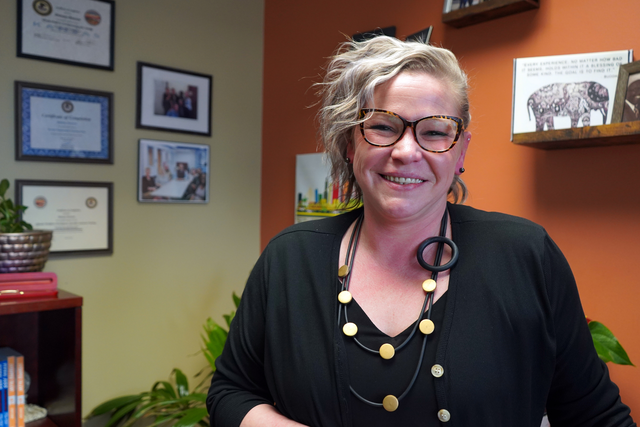
How would you feel if you were forever defined by your worst day? For those with felony convictions, this is all too real.
Regardless of the reason they enter prison, those wanting to make changes to their lives and move on face a mountain of challenges upon discharge. The world moves on without them, often quickly. Relationships and coping strategies they used to rely on may need to be cut off or avoided as they brave their new environment and try and build a new life. And many job opportunities and social services are not available to them.
Those impacted in this way face higher rates of poverty, homelessness, substance abuse and prison reentry. But, there are organizations and people whose mission is to come alongside these individuals as they work toward a better future.
Brittany Peterson is the Reentry Project Supervisor at Second Chance Risk Reduction Center, a program of the Kansas City Crime Commission. The program is for Kansas City, Missouri residents on parole for felony convictions and who are willing to commit to their weekly programming. For Brittany, it’s more than a job — it’s her life’s work.
“We help individuals returning from incarceration to reestablish themselves, access new opportunity, and realize their real potential,” Brittany says. “Our population unfortunately gets locked out of basic Maslow’s Hierarchy of Needs and our responsibility, our duty, is to meet each of our clients where they’re at, and make sure that they’re able to show up for themselves and invest in themselves. To again realize that real potential and not worry about how to exist.”
Harvesters partners with Second Chance to stock an onsite pantry, which is available to everyone who is in the program. Participants have access to fresh produce, meat and other protein sources, shelf-stable items and snacks to make sure that they are taken care of while they get back on their feet.
As soon as you walk through the doors at second chance, you are greeted by the Second Chance Wall of Fame, sporting dozens upon dozens of smiling portraits of program graduates. Their stories are collected in a book, and on their website. In Missouri, the reincarceration rate is about 67% within three years of exiting prison. For graduates of the Second Chance program, that rate is less than 5%.
Second Chance offers an array of services to help these individuals on their journey. They provide job skills training, physical and mental healthcare access, access to educational services to get their GED/Diploma or pursue higher education, interview skills coaching, and transportation assistance.
Those with felony convictions can face such a stigma. But Britttany and her team are dedicated to showing that everyone is capable of change, and no one should be defined by their past. That a society willing to give a second chance is a healthier one, for everyone.
“They are our neighbors. They are the parents of our children’s playmates. They are in line with us at the grocery store, and yet they don’t have the same opportunity. Crime costs the community a lot of money. Warehousing humans costs taxpayers a lot of money. We also have relatively low unemployment and lots of jobs out there, and employers unable to fill the jobs because they either are ignorant about how to, or just completely discouraged in participating in fair hiring practices.
It affects absolutely everything in our community. If we can make our population more self-sufficient, then they’re able to be better role models and community members and better mentors to the kids that are probably going to get in trouble because they don’t know any other way out.”
Spending just a few hours at Second Chance, the comradery among the participants and the staff is palpable. Peer support is a big part of the program, and group members get a chance to take parenting skills classes and nutrition courses where they can honestly share their experiences and their feelings. For many, it’s the first time they have a safe group of peers that are authentically there to support each other. It’s a beautiful thing to witness. To Brittany, it never gets old
“When you see the spark,” she says. “When you see the light go off and a client goes, ‘I totally don’t have to be in my own way if I just show up in the right place, in the right order, with the right mindset prepared,’ then everything clicks into place and everything just starts happening in the most positive and wonderful way. I literally see the spark in them.”
Around the Second Chance office, you will find a lot of elephants. Figurines, paintings, even branded tote bags. Brittany and her team use the metaphor of an elephant to talk about how overwhelming the tangle of obstacles is for those trying to reenter society in a new way. A big, angry knot of muscle and cracked hide. But according to them, their job is to help their clients eat that elephant. And how do you eat an elephant? One bite at a time.